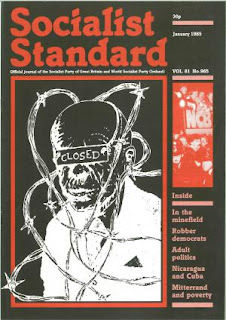Book Review from the February 1985 issue of the Socialist Standard
Mrs Thatcher's Economic Experiment by William Keegan (Penguin. 1984).
William Kegan begins his book with a question:
How, then, did it come about that a Conservative administration after 1979 allowed the country to suffer the worst recession since the war, with manufacturing output dropping by nearly 20 per cent, and unemployment more than doubling—from 1.3 million to nearly 3.5 million in 1983?
We are in the midst of a global recession but, according to Keegan, Britain has suffered disproportionately in comparison with other countries. He supports a Keynesian economic perspective in which the government should intervene to stabilise economic activity and employment. Thatcher supports a free market economy. He says that she reacted against formal incomes policies and against the position of Edward Heath and his sensible reforms in trade union legislation" (p.27). Monetarism was embraced specifically to tackle inflation.
Keegan sees the monetarists as evangelicals in that they chose to elevate the one policy as the cure-all for society's ills and held that no other perspective could or would be tolerated. He also defines the Thatcher administration as being based on economic liberalism which favours the free market economy without state intervention. Incomes policies were seen as "impeding the harmonious workings of unfettered market forces" and therefore enhancing the role of the state, so "posing threats to liberty and freedom" (p.76). This seems to contradict the fact that the state was keen to attack the trade unions but, it was argued, this was because the unions had monopolistic power. It was said that they could price workers out of jobs. Given the massive rise in unemployment during the first Thatcher administration it is difficult to see the logic underlying the supposed power of the trade unions, which should presumably have been steadily increasing during the period of that administration. The reality is that trade union power was being eroded during an initial period which also saw a massive increase in inflation.
The author catalogues the now familiar consolidation of Thatcher's base by rejecting her detractors and taking on board her supporters. He presents an accurate picture of the politicising stance adopted by the government in which, for instance, attacks on the unions detracted from the economic mess being created. He also pinpoints the double edge of the Thatcher strategies in which the spending of money on electronic gadgetry in schools was offset by cuts in allocations for textbooks. The author's attacks on the government are based on what he sees as its failures: it did not revive the entrepreneurial initiative and it increased the tax burden while promising a reduction. This suggests a misconceived administration whereas the Thatcher experiment represents an essential inability to control capitalism.
Keegan does make some pertinent criticisms about the notion of democracy in this country It is not simply that a large parliamentary majority means that each policy can be presented as a fait accompli but that, for instance, "all those ad hoc decisions about the exchange rate in 1979 and 1980 . . . were made well away from the floor of the House — and indeed from the Cabinet table" (p. 184) Thatcher's inner cabinet could dictate policy. This is not simply a critique of the nature of the Conservative Party but pinpoints the flaw in what masquerades as democracy in contemporary society. Decisions are taken over which there is virtually no control. The Thatcher government justifies its position by constructing linguistic walls in which There Is No Alternative and in which there is light at the end of the tunnel. There can be no U-turn. This is not to say that the original plan was carried through as intended. The government has intervened in the market place, companies have been given financial assistance, aspects of public expenditure, notably defence and law and order, have increased. Keegan argues that:
when monetarism was seen to be flawed. Mrs Thatcher was prepared to acquiesce in decisions which did not accord with pure monetarism, (p.200)
Such a pragmatic approach does not detract from the fact that the overall economic stance was maintained. Nor does it suggest that pragmatism presupposes a correct method of running capitalism; having gained hold of the reins of power, slight bends were acceptable as long as the reins remained in hand. Power was not relinquished even in the midst of a profligate waste of human resources. The satisfaction of human wants is subsumed by an ideology which accepts unquestioningly all the kicks in the face that capitalism brings. It is not simply a need to restore entrepreneurial initiative but to create the conditions in which the restrictions of the capitalistic mode of production can be removed. This is not achieved by such misguided notions as controlling the money supply (however this may be defined). for money represents the methodology whereby the enslavement of human potential is achieved.
It is not sufficient to argue that the Thatcher experiment has been less successful than policies pursued by governments elsewhere. This hides the reality of capitalism's essential inefficiency Keegan damns the Thatcherites:
The evangelicals believed passionately that they were right, and their dogmatic fervour brooked no criticism. They had discovered their god, and there could be no alternative within the scheme (p.206)
Developing this image, capitalism has become the god. There are different factions that believe their ideologies will explain and appease that god. Rather, we should address ourselves to the death of that god and its replacement by a system of society in which people and their needs are the consideration To use the cliches of the Thatcher administration, the light at the end of the tunnel will always be around the comer. To get around that comer is to get rid of capitalism. This is not to suggest an evangelical alternative but a practical and real necessity
Philip Bentley









